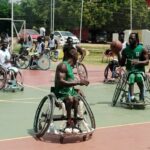Expert calls for use of AI in laboratory medicine
AI
By Ijeoma Olorunfemi
Abuja, Dec. 7, 2024 (NAN) Dr Emeka Chukwuka, a Machine Learning Operations (MLOps) specialist, has advocated the use of Artificial Intelligence (AI) in pathology practice in order to ensure better laboratory outcomes.
Chukwuka made the call in Abuja at the 19th National Scientific Conference and yearly General Meeting, organised by the College of Nigerian Pathologists (CNP).
The conference was tagged “Jewel 2024.”
He emphasised on the transformative potential of AI in enhancing diagnostic accuracy and streamlining laboratory operations, adding that the integration of AI into clinical workflows would help optimise outcomes.
Chukwuka said that the technology would enhance efficiency in laboratory medicine, data analysis and also enable quicker and more reliable interpretations of complex medical data.
“It will also improve patients care.’’
According to him, creating a standardised framework for validating AI tools is essential to ensuring accuracy, reliability, safety and improving patient care in pathology.
He said that robust ethical standards and regulatory frameworks were vital in addressing data privacy, consent and bias, while ensuring equitable healthcare delivery.
Chukwuka said that the Nigerian healthcare systems faced significant challenges, including inefficient data management, outdated infrastructure and suboptimal Electronic Health Records (EHR) and Laboratory Information Management Systems (LIMS).
He, however, recommended a comprehensive training programmes to help pathologists effectively use AI tools and establish ethical guidelines for data privacy.
“This will ensure confidentiality and facilitate responsible use of AI in pathology practice.
“Now is the time to integrate these cutting-edge technologies into our practices as pathologists.
“A robust technological infrastructure is needed, such as modernising laboratory systems for AI integration, enhancing data storage and processing for effective pathology,” Chukwuka said.
Prof. Saleh Yuguda, Director General, National Blood Service Agency (NBSA), who was one of the guest speakers at the conference, outlined the critical role of blood transfusion in healthcare.
Yuguda listed some of the challenges of blood transfusion in the country, including inadequate supply and safety concerns but said that efforts were on to find a lasting solution.
He said that the agency had always worked to ensure safe, quality blood services through regulation and donor mobilisation.
“Pathologists play a vital role in testing, providing expert advice and educating healthcare professionals.
“As such, there is need for collaborative effort among stakeholders to enhance blood transfusion services and ensure safety and accessibility for all Nigerians,” he said.
Yuguda said that the agency was faced with the challenge of data management on blood transfusion services from centres within the country.
He, therefore, solicited the support of pathologists, especially those in leadership positions in the tertiary healthcare facilities to streamline the agencies’ services and bring its plans to reality.
On his part, Prof. Yusuf Abdullahi, Chief Medical Director, Federal Teaching Hospital, Gombe, emphasised the need for excellent leadership that prioritised infrastructure, personnel and technology acquisition, to ensure a formidable healthcare system.
Abdullahi, who explained how the institution had strived to train doctors and healthcare personnel, called for investment in staff training.
Dr Abimbola Amusu, President, College of Nigeria Pathologists, said that pathologists were essential in diagnosing and monitoring diseases.
“We are critical in ensuring the delivery of quality healthcare by ensuring accurate and precise diagnoses and advising on therapeutic strategies.
“Government and managers of health facilities should as a matter of urgent importance provide an enabling environment for pathologists to practice.
“It is important that we engage in these advancements actively, through partnership between pathologists, government and healthcare providers to ensure quality healthcare delivery.
“As pathologists in diagnostic medicine and monitoring of disease, it is necessary that we not just join the train, but we should sit and design the best diagnosis and treatment support for patients.” (NAN)(www.nannews.ng)
NIU/CJ/
=======
Edited by Chijioke Okoronkwo












